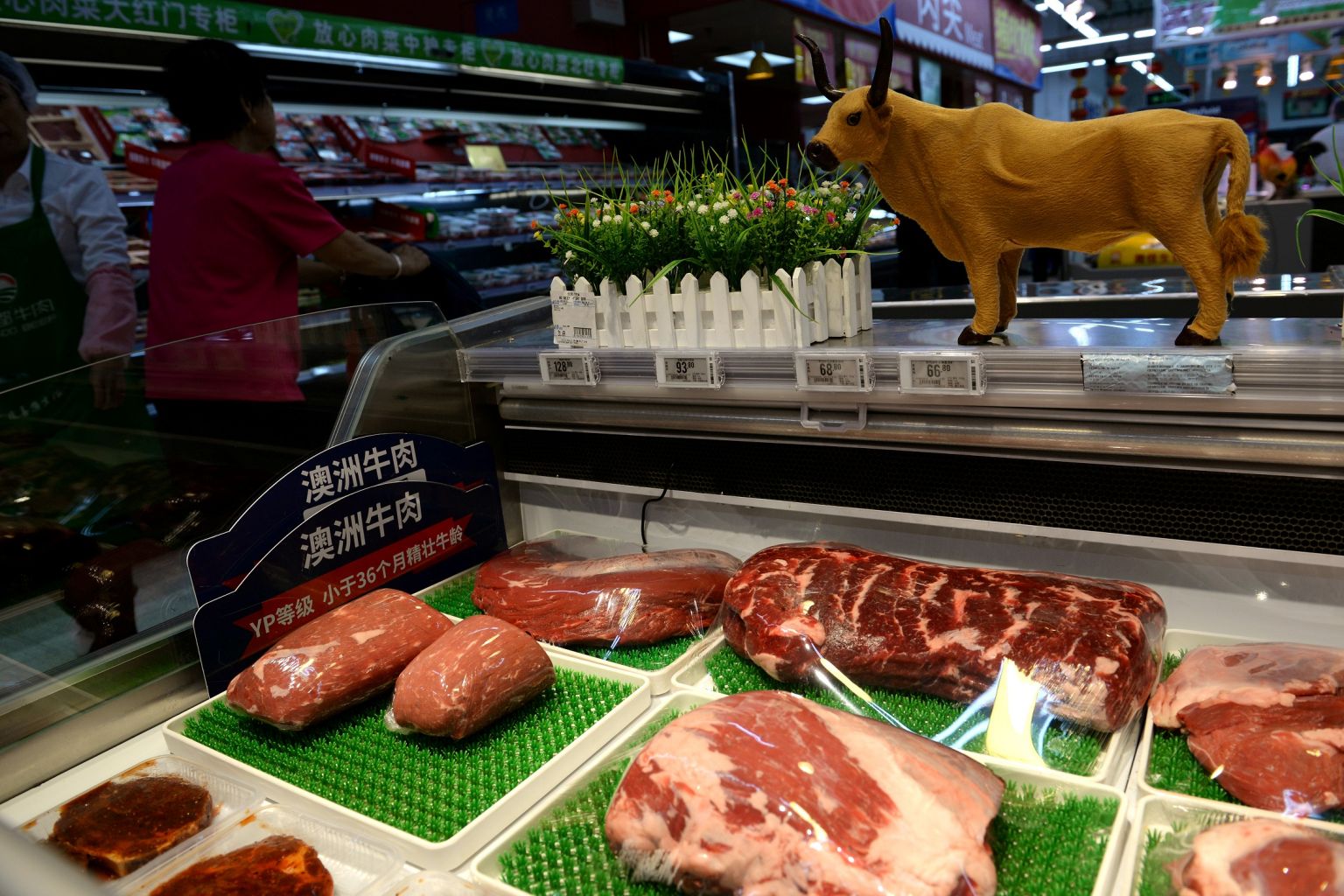Australia-China trade ties likely to stay intact, despite icy diplomatic relations
Sign up now: Get insights on Asia's fast-moving developments

Beef for sale is seen at a Walmart in Beijing, China.
PHOTO: REUTERS
Follow topic:
SYDNEY - When Australia's Trade Minister Simon Birmingham learnt that China had not only blocked beef imports but was also about to impose hefty tariffs on Australian barley, he tried to put a call through to his Chinese counterpart. But Beijing did not return his calls.
The problem for Canberra was that its escalating dispute with Beijing is not merely about trade. The two countries have experienced worsening ties in recent years as they quarrelled over Australia's efforts to curb foreign meddling and its ban on Chinese telecommunications firm Huawei from participating in its 5G network.
The deterioration in relations has only been exacerbated by the Covid-19 pandemic.
Last month, the Morrison government announced it would push for an independent inquiry into the origins of the pandemic. This infuriated Beijing, which believed it was being targeted by Canberra.
In the past, Australian governments have prided themselves on holding the line against China's meddling in its affairs.
Australia was among the first countries to introduce serious foreign interference legislation, including tighter rules for screening overseas investment, and it was the first to completely block Huawei, though others have since followed.
So China viewed Australia's call for an inquiry as yet another instance of an Australian government spearheading a pushback against it on the world stage.
Australia's Foreign Minister Marise Payne was not helped by her announcement of the inquiry coming just as Donald Trump was making increasingly strident accusations about China's cover-up of its outbreak. And Canberra quickly discovered that countries such as Britain and France were unenthusiastic about the inquiry because they were still in the grip of serious Covid-19 outbreaks.
Australia's apparent assault against Beijing prompted defensive fire by China's Ambassador to Australia, Mr Cheng Jingye, who accused Australia of pandering to Washington and teaming up with the White House to "launch a political campaign against China".
Mr Cheng went further, suggesting that Canberra's move could prompt Chinese consumers to avoid buying Australian beef or wine.
In turn, Canberra accused China of using "economic coercion".
Days later, the feud intensified as Beijing appeared to make good on its threats and banned beef imports from four Australian abattoirs.
This week, China imposed an 80 per cent tariff on Australian barley. The moves will cost Australian producers heavily, just as they face a global economic slowdown.
China did not officially link its decisions to provocation from the Covid-19 inquiry. It says the beef ban was due to health standard concerns, and the barley tariffs followed long-running accusations that Australia was "dumping" barley at cheap prices and was subsidising growers - claims that Canberra denies.
But the timing for China's actions suggests that it was, at least, convenient to impose the trade sanctions now, when they would be seen as a punishment for Australia's perceived attempt to discredit it.
Canberra insisted it wanted an impartial inquiry into the pandemic and was not trying to lay blame, but this did not placate Beijing.
The question is how this spat ends.
Despite the icy political and diplomatic relations between the two countries, trade ties are likely to remain intact. Though China may seek further retribution, both countries need each other.
Australia's economy heavily relies on trade with China, which accounts for a third of Australian exports. This trade will be crucial for Australia's post-pandemic economy recovery.
China's rapid growth, in turn, relies on Australia for a steady flow of resources, particularly iron ore.
Officials from both sides are in contact, but the high-level freeze continues. No Australian prime minister has visited China since 2016. Australia's current Prime Minister Scott Morrison is awaiting an invitation from China's Xi Jinping, quite possibly an interminable wait at that.

